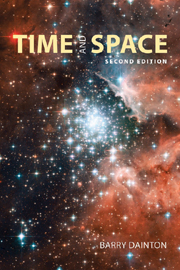Book contents
- Frontmatter
- Contents
- Preface to the second edition
- Preface to the first edition
- 1 Preliminaries
- 2 McTaggart on time's unreality
- 3 The Block universe
- 4 Asymmetries within time
- 5 Tensed time
- 6 Dynamic time
- 7 Time and consciousness
- 8 Time travel
- 9 Conceptions of void
- 10 Space: the classical debate
- 11 Absolute motion
- 12 Motion in spacetime
- 13 Curved space
- 14 Tangible space
- 15 Spatial anti-realism
- 16 Zeno and the continuum I
- 17 Zeno and the continuum II
- 18 Special relativity
- 19 Relativity and reality
- 20 General relativity
- 21 Spacetime metaphysics
- 22 Strings
- Notes
- Glossary
- Web resources
- Bibliography
- Index
Preface to the second edition
- Frontmatter
- Contents
- Preface to the second edition
- Preface to the first edition
- 1 Preliminaries
- 2 McTaggart on time's unreality
- 3 The Block universe
- 4 Asymmetries within time
- 5 Tensed time
- 6 Dynamic time
- 7 Time and consciousness
- 8 Time travel
- 9 Conceptions of void
- 10 Space: the classical debate
- 11 Absolute motion
- 12 Motion in spacetime
- 13 Curved space
- 14 Tangible space
- 15 Spatial anti-realism
- 16 Zeno and the continuum I
- 17 Zeno and the continuum II
- 18 Special relativity
- 19 Relativity and reality
- 20 General relativity
- 21 Spacetime metaphysics
- 22 Strings
- Notes
- Glossary
- Web resources
- Bibliography
- Index
Summary
In the preface to the first edition I drew attention to the absence of any mention or treatment of Zeno's paradoxes. Given that much of the book was (and is still) largely concerned with two questions – Does time pass? Does space exist? – this omission was justifiable, but also regrettable. Several chapters are devoted to questions relating to motion, and Zeno's paradoxes raise serious questions about how motion can occur, even though we are confident that it does. These same paradoxes are also closely bound up with various issues relating to infinite divisibility and the microstructure of the continuum; these issues may pertain more to the nature of time and space than their very existence, but they are no less fascinating for that. I have taken advantage of the opportunities offered by a second edition to remedy this omission: Zeno's paradoxes are now discussed. Mindful of the dangers of covering difficult material in only a superficial manner – infinity is a more perplexing topic than most – the treatment is quite detailed, and extends over two substantial chapters.
Although these new chapters constitute the most significant divergence from the first edition, there are a number of others. Several of these are to be found in Chapter 6, where various “dynamic” conceptions of time are discussed. One of the main developments over the past decade has been the growth of interest in Presentism (the doctrine that only what is present is real), and my treatment of this topic has expanded accordingly.
- Type
- Chapter
- Information
- Time and Space , pp. xi - xiiPublisher: Acumen PublishingPrint publication year: 2010



